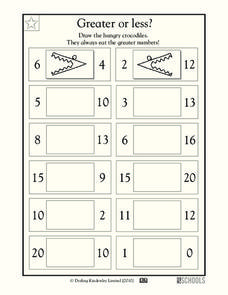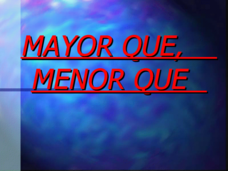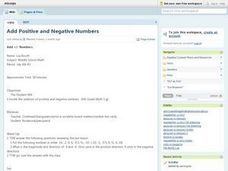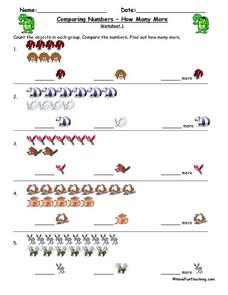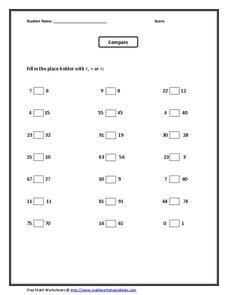Curated OER
Lots of Lakes: Greater Than, Less Than
To set up this activity, your class explores Minnesota's nickname as the Land of 10,000 Lakes, and the back of the state quarter that features a Minnesota lake. Young mathematicians compare the number 1 to the number 10,000 with support...
Curated OER
Greater or Less?
These crocodiles are hungry for the biggest numbers they can find! This is a fun way to illustrate number comparison; use crocodile mouths as the greater than and less than symbols. There are two examples (with teeth and eyes included)...
Curated OER
Double Your Money
What a creative way to delve into adding large numbers! After listening to a story called The King's Chessboard, learners estimate how much money they would have each day following instructions based on doubling and exponentially...
Curated OER
Ordering Rational Numbers and Finding Their Approximate
Middle schoolers explore the concept of ordering rational numbers on a number line. They represent rational numbers as decimals and percents. Pupils create a foldable about converting fractions to decimals to percents, and use a...
Curated OER
Fraction and Decimal Ordering
Ordering numbers just got physical! Learners practice putting numbers in sequence, both in fraction and decimal form. To begin, they line up in birthday order and discuss the difference between ascending and descending. They are then...
Curated OER
Compare and Order Numbers
Students compare and order numbers to 100. They count numbers forwards and backwards. Given specific numbers, students place the numerals in the correct order. Students use bean bags, cubes, or blocks to compare and order numbers.
Curated OER
Comparing and Ordering Decimals - Complete Lesson Plan
Base ten blocks serve as visual representations of numbers that include decimals to the hundredths place. Children compare and order decimals in their math journal as they build the corresponding numbers with base ten blocks.
Curated OER
Use Models to Compare and Order Integers
Students investigate the concept of integers and how they should occur in the realm of irrational numbers. The lesson includes the use of positive and negative integers. The lesson is a good foundation in order to move into calculating...
Curated OER
Reading, Writing, and Ordering Numbers
Students study place value. Students participate in place value and number relay games, write numbers in words, and discuss how numbers are read. As a class, they discuss the meaning of less than and grater than signs. Students use...
Curated OER
Unit 5: Order Whole Numbers in the 100s and 1,000s
There are three quick number ordering activities here for your mathematicians. First, they analyze data on the number of three types of pies sold. Scholars choose from four ordered lists the one showing fewest to most sold. Then, they...
Curated OER
Ordering Integers
Sixth and seventh graders compare and order integers. After locating integers in a newspaper, they describe examples of negative and positive integers. They draw a thermometer and locate positive and negative integers on the scale. In...
Curated OER
Compare and Order Fractions
In this compare and ordering fractions worksheet, students compare fractions and order them from least to greatest. Students compare 6 fractions and order 20 sets of fractions, and answer 4 word problems.
Curated OER
Chapter 2 Review: Prime Factorization
In this prime factorization worksheet, learners find the prime factorization of numbers by using a factor tree. They compare fractions and identify equivalent fractions, and find the greatest common factor, order numbers, and convert...
Curated OER
Numeracy
Students review numbers, number systems and the number operations through the use of online webpages.
Curated OER
Mayor Que, Menor Que
While only a simple presentation about the concept of less than and greater than, it could be used in a classroom with Spanish speakers to present this topic. Within the series of slides, the idea of less than and greater than is...
Curated OER
Add Positive And Negative Numbers
Scholars investigate the concept of adding positive and negative numbers. They practice adding using the number line for scaffolding. This can be done as a game for younger learners, but may also be helpful for engaging the older pupils.
Alabama Learning Exchange
As If Numbers Weren't Complex Enough Already!
The class explores the concept of complex numbers on a website to generate their own Mandelbrot sets. They will practice performing operations with complex numbers and then to get a visual understanding, graph the absolute value of a...
Curated OER
Mastering Math Vocabulary of Prime and Composite Numbers Using Venn Diagrams
Create Venn diagrams. Your class will discover the relationships between even and prime numbers. Next, they will compare that to the relationship between odd and composite numbers.
Curated OER
Comparing and Ordering Greater Numbers
Students line up the digits of the numbers they are comparing in the correct manner. For this comparing numbers lesson, students learn to line numbers up correctly on a place value chart before comparing them. Students then answer...
Curated OER
Comparing Numbers - How Many More
In this number comparisons worksheet, students count the objects in each group and compare the numbers. Students write how many more pictures there are in the 25 problems.
Curated OER
Comparing Numbers
In this number comparison instructional activity, learners fill in the less than, greater than, or equal to symbol in order to compare two numbers. There are 21 two-digit and one-digit numbers to compare.
Curated OER
Comparing Three Digit Numbers
For this comparing numbers worksheet, students solve 12 problems in which two 3 digit numbers are compared. Students mark the correct answer: is greater than, is equal to, is less than.
Curated OER
Comparing Numbers
In this comparing worksheet, students compare decimals and percents. They identify the largest and smallest number in a dequence. This one-page worksheet contains 10 multiple-choice problems. Answers are provided.
Curated OER
Earth Day Number Sense
Elementary schoolers count and order objects using numbers 1-300. They bring recyclable items from home. Students group the items, skip count by 2's, 3's, and 5's, and arrange the items on a number line. Recyclable plastic bags are put...



